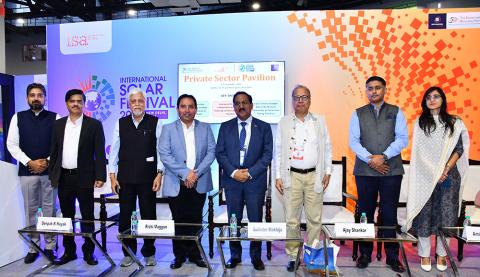India strengthens North-South partnerships for accelerating solar energy transition at International Solar Festival 2024

New Delhi, September 05, 2024: The Leadership Panel on ‘India's enhanced role in North-South partnership for faster solar energy transition,’ held during the International Solar Festival 2024, brought together key stakeholders to discuss India’s pivotal role in advancing global solar energy adoption. Organized by The Energy and Resources Institute (TERI) in collaboration with the Becquerel Institute, the panel was part of the Private Sector Pavilion and saw participation from leading solar industry experts, policymakers, and business leaders.
India’s success in scaling solar energy gives confidence to achieve net-zero by 2070, say global experts
The session commenced with an engaging address by Mr Vivek Kumar Dewangan, Chairman and Managing Director, REC Ltd, who outlined India's remarkable journey in scaling up renewable energy capacity by 250 percent between 2014 and 2021, establishing the country as the world's fourth-largest in renewable energy. “The Hon’ble Prime Minister has announced the programme of providing one crore household with rootstock. This is a very ambitious programme to install one crore rooftop solar in next two to three years. Ministry of New and Renewable Energy has made REC as the national programme implementation agency for achieving this target of one goal, rooftop solar. My understanding is, this is the only program of its kind and of its scale in the world,” added Mr Dewangan.
The presentation underscored India's commitment to sustainable development, detailing its strategies for expanding renewable energy generation, investing in energy efficiency, and utilizing green hydrogen for storage solutions to reduce dependency on fossil fuels.
Panelists from diverse geographies and sectors contributed valuable insights into India’s role in fostering stronger North-South partnerships for accelerating solar transitions.
Highlighting the challenge faced on the transmission network, Mr Deepak Kumar Nayak, Business Head, Solar EPC, L&T, noted, “The solar development doesn't take two years. For a 500 megawatt or 1 GW plant, one can complete it in 12 to 18 months, but the wait is for the transmission network. We really need to ramp up the transmission and distribution network to achieve 30 gigawatts per annum going forward for next six years.”
Emphasizing that the time has come for solar energy to be available free, Mr Rishi Maggon, Asst. Vice President, Projects, Tata Projects Ltd, “We have to scale up. But definitely the assets which we create should last for 25, 30 years, or even more. We need to keep in mind, whatever we are doing has to continue.”
Mr Amit Sengupta, Vice President, Finance, Avaada Group, further added, “I think in the last 14 years, India has seen the entire change. I think our geography allows us to take so much learning out of the whole development process that India rightfully can take that lead for the global south in developing the renewable energy project.”
Reflecting on the panel, Ms Chetna Sharma Baranwal, Vice President & Head- New Initiatives and Sustainability, Indus Towers Ltd, added, “In order to scale up, there has to be some sort of commitment from each of our organizations to achieve the net zero target. Solar is a mature technology.” “Government’s role has been crucial. There are clear directions from the centre, that region of open access should be allowed to,” she further highlighted.
“I think the biggest challenge in Indian lies in energy storage. Once we have an economical, achievable energy storage system, it will be a game changer. Storage of energy through pumping is being considered in many cases. Yet, I think looking at the scale that we are going looking to implement, in the next five to six years’ time, it's not difficult,” underscored Mr Surinder Makhija, Vice President and Senior Strategic Advisor, Jain Irrigation Services Ltd.
Moderating the panel, Mr Ajay Shankar, Distinguished Fellow, TERI, reflected on India’s solar journey to be an extraordinary success story. He said, “When we began in 2010, our capacity was barely a couple of hundred MWs. A target of 20,000 MWs was announced. Today not only did we reach it, but we have overachieved by four times," he said. “It is this success that is giving us the confidence that we can actually achieve the target of reaching net zero emissions by 2070. And solar is the driver of that transition,” he further added.
The Leadership Panel served as a knowledge-sharing forum, offering practical insights on scaling renewable energy solutions and fostering international collaboration. As countries around the world strive to balance the dual challenges of meeting growing energy demands and mitigating climate change, India's experience continues to provide a valuable template for success.
The Becquerel Institute has been actively collaborating with the ISA to enhance a resilient global supply chain for the solar industry. This includes identifying policy levers to promote local PV manufacturing in emerging markets and developing an integrated approach to photovoltaic (PV) development that supports both market expansion and local industry growth. The institute continues to build strong connections with industry players, trade organizations, and research bodies worldwide, contributing to a holistic approach to solar energy advancement.
The International Solar Festival 2024, organized by the International Solar Alliance (ISA), celebrates the transformative power of solar energy in creating sustainable futures. The festival showcases innovative solutions, partnerships, and strategies for achieving universal energy access and advancing the Sustainable Development Goals.
